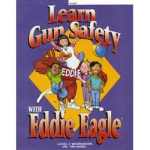The NRA decided years ago that there’s no seat at the table for physicians when the committee hearing or the funding agency gets together to talk about guns. They don’t even want physicians talking to their own patients about guns and they certainly don’t want the Surgeon General ever to say anything about guns. But while such aggrieved nonsense may play well with the NRA faithful, particularly repeated by a putative Presidential candidate, those who live in the real world know that we all need a physician when it comes time to make critical decisions about our health.
One of the critical health decisions for which people might need medical counsel is whether or not to carry a gun. Now I know that the pistoleros who spend every vacation sharpening their skills at shoot-em-up amusement parks like Gunsite or Thunder Ranch don’t need help deciding whether their eye-hand coordination will let them emerge victorious from the fray, but there must be plenty of people among the eight million Americans now holding CCW privileges who don’t have the physical or mental dexterity that handling a lethal weapon requires.
 Even though a majority of now states issue CCW on a “shall” (required) rather than a “may” (discretionary) basis, there are hardly any states that do not grant the official issuing CCW the authority to deny a permit if the applicant, regardless of legal background, might use a weapon to endanger himself or someone else. The NRA would probably say that one of their local members should be consulted in cases like this, but you and I know that the licensing authorities will turn to a physician because a doctor is the only professional they can really trust.
Even though a majority of now states issue CCW on a “shall” (required) rather than a “may” (discretionary) basis, there are hardly any states that do not grant the official issuing CCW the authority to deny a permit if the applicant, regardless of legal background, might use a weapon to endanger himself or someone else. The NRA would probably say that one of their local members should be consulted in cases like this, but you and I know that the licensing authorities will turn to a physician because a doctor is the only professional they can really trust.
But this brings up a little problem. Because it turns out that many physicians don’t trust themselves to make competency decisions about whether people should own or carry guns. The American College of Physicians conducted a poll which revealed that two-thirds of its members didn’t counsel their patients on firearms because they didn’t know enough about how to treat patients at risk for misusing their guns. A similar poll conducted by the American College of Emergency Physicians in 2013 said the same thing.
We now have a new poll that asked physicians in North Carolina whether they felt comfortable responding to requests from county sheriffs who needed to verify the physical or mental competency of someone wanting to carry a gun. This poll, of whom one-third of the respondents indicated they owned guns, found that 60% of the physicians did not feel they could “adequately assess” whether their patient was physically capable of carrying and using a concealed gun, and nearly 50% felt they could not determine CCW competency on mental grounds. As for those who think that the medical profession has been cowed into submission by the lunacies of a self-certified Kentucky opthamologist and a small, pro-gun fringe, a majority of the respondents did not believe that the doctor-patient relationship would suffer if they didn’t certify the patient as being fit to carry a gun.
The real knowledge deficit created by defunding CDC gun research is not whether guns are a medical risk. The bigger issue is the fact that, when confronted with a patient possibly at risk to commit (or be the victim of) gun violence, many physicians don’t know what to say or do. Now that the American Medical Association has just endorsed the idea of medically-accredited gun violence education, perhaps the gap will begin to close. And if anyone out there thinks their physician is now their enemy because he wants to talk about guns, perhaps you should make an appointment for your next checkup with Doctor Rand Paul.


Recent Comments